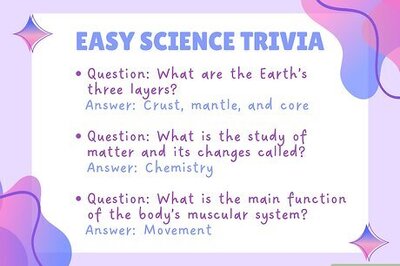
views
Sample Answers for 'What Inspires You?'
Role models People you've looked up to in your life are always great to use as sources of inspiration. This gives the interviewer a look at who you are as a person and the type of people you have in your life, as well as what you admire. Here are some examples: "I'm inspired by my uncle. He moved to the United States from the Philippines with nothing but the clothes on his back and today he owns a successful business. He taught me to never give up pursuing my dreams." "I've always been inspired by my sixth-grade teacher. She was the first to tell me I had a good eye and encouraged me to develop my visual skills. Without her, I never would've become a designer."
Personal experiences If you've overcome adversity, or helped someone else overcome adversity, look for the inspiration in that. People tend to love a good underdog story where someone beats the odds. Share this source of inspiration and your interviewer might find themselves inspired by your story as well. For example, you might say: "Losing everything in the flood taught me to value connections with people over material things. That experience inspires me daily to nurture my relationships with people in the industry, which translates to more sales and a strong reputation." "Helping my friend battle cancer inspired me to stop procrastinating. Because of that experience, I know that the future is not guaranteed and the time to act is now."
Hobbies Sometimes a hobby or other activity you do in your free time can provide inspiration that carries over into your work life or the way you approach your career. This also gives you an opportunity to potentially relate to the interviewer if you happen to share the same hobby or interest. Here are some examples: "Playing soccer taught me the value of teamwork and inspires me to build a team that works together to achieve their goals." "Woodworking inspires me to focus on the details of my work. Since I got into this hobby, I find myself paying attention to more of those little things than I used to, and it's made all the difference in the quality of my work."
Social values or interests Whether you're driven to change the world or just want to improve your local community, the desire to change things can be incredibly inspiring! Talk about something you fight for and how it impacts the way you approach your work. This type of inspiration works especially well if you're interviewing for a position in a nonprofit or community organization. Here are some examples: "A child's smile is inspiring to me, which is why I love working with kids. Making sure they feel safe and happy drives me to be the best social worker I can be." "This community inspires me because it's so close-knit. I thrive in that type of environment and look forward to working with a similarly close-knit team."
Core beliefs If you find your core beliefs echoed in the mission statement of the company you're interviewing with, that's a great opportunity to reinforce how important that belief is for you. Make it a source of inspiration and you're telling the interviewer that you would be personally invested in fulfilling the company's mission. For example: "Saving the environment is really important to me and it inspires me to see the difference that sustainable choices make in the world. I'm really motivated by opportunities to make projects more environmentally sustainable and less wasteful." "I've always been drawn to the plight of refugees. Their stories inspired me to go to law school and become an immigration attorney so I can fight for their rights."
Successful public figures A public figure might not exactly be a role model in the sense that they didn't mentor you personally, but they still might have inspired you to do something that you wouldn't have had the courage to do otherwise. It helps if you can explain a personal connection that you have to the person. For example, you might say: "I find Oprah Winfrey inspiring. I, too, grew up poor and Black in the South, and I relate to her struggle to find her voice. If she can become so successful, I feel like I can too." "I find Shaun White inspiring because he's still innovating. He could retire and rest on his laurels but he's constantly pushing for more. That pushes me to keep trying to find new and better ways to do things, even if what I've already done is good enough."
Learning new things Are you insatiably curious? If so, you might tell the interviewer that you're inspired by learning new things or finding new connections. This type of inspiration is especially valuable if you're interviewing for a research or analytical role. For example, you might say: "Finding new connections and correlations between data sets is inspiring to me. I find data beautiful and I love how it can teach us new ways of looking at the world." "I've always loved learning new things, which is why I was drawn to research. My inspiration to learn drives me to seek out information about details others might have overlooked."
Achieving hard goals Employers tend to love a goal-oriented person. If having something to reach for is part of what propels you forward, by all means let the interviewer know. You might say: "I'm really inspired by the feeling I get when I achieve something I'd previously thought was difficult or impossible. The harder the goal, the more motivated I am to see it through." "There's nothing quite like the feeling of getting something done under budget and before deadline. I'm inspired by that feeling to constantly improve my performance."
Helping others If you gravitated towards a helping profession or even the service industry, chances are you find it inspiring to help others. This can make for a pretty obvious answer to the question, though, so make sure you make it really specific to you as a person. For example, you might say: "I'm inspired by the relief I feel from someone after I've found a remedy for their pain. When I see someone suffering, I'm ready to do everything I can to make it stop—that's why I became a nurse." "It inspires me to know that I'm making a difference in the lives of people who will probably never even know who I am. It drives me to do everything I can as a social worker to improve this community."
Solving complex problems If you feel the fire light up in your mind when you look at a problem that has everyone else stumped, you could say that you're inspired by complicated or difficult problems. This is a particularly good response if you're in an industry in which you're constantly faced with issues of varying degrees of complexity. "I'm inspired by the thought that something seems impossible. If a problem seems insurmountable, I'm that much more motivated to find the best, most efficient solution." "I find it inspirational to see a lot of different pieces of a large project come together. I'm driven by making complicated things seem elegant and simple."
Being part of something bigger than yourself Sometimes it's not about taking the spotlight or getting credit for something you did, but about being a small piece of something that's making a huge difference. If this inspires you, here are some things you might say: "I find purpose in knowing that I'm part of this larger movement that's really making a difference in the lives of everyday women. I'm really inspired by the work that this organization does and hope to help it succeed." "I'm inspired by the work of the labor movement in general and how they stand up for the rights of workers. It's meaningful for me to feel like I'm part of that movement, even if I'm just a receptionist."
New or different perspectives Perhaps you get inspired by looking at things in different ways or talking to people with radically different perspectives than yours. This is a great thing to mention as an inspiration if you work in a creative field. Here are some ideas: "I get inspired by out-of-the-box thinking. I'm constantly talking to people outside the field to get different ideas that aren't limited by industry assumptions." "I've gotten all of my best ideas by talking to people with a completely different background and mindset from me. It inspires me to try out different perspectives so I can create truly unique solutions."
Why do interviewers ask this question?
They want to understand what drives you when the going gets tough. Regardless of the hard skills you bring to the table, different types of people are better suited for different roles. Understanding what motivates and inspires you also provides insight into what you're looking for in a position where you could excel. For example, if you're someone who is inspired by networking and making new connections, you might be great in a customer-facing position where you talk to new people every day. On the other hand, someone inspired by connecting with others would likely not do well in a position where they worked on a computer all day and had no direct interaction with other people.
Preparing for Your Interview
Learn about the company's work culture and goals. Check out the company's website and any other materials you can find so you can learn something about the company's values. Write down the ones that you would consider your values too. This can serve as your starting point when formulating answers to the more personal interview questions. For example, if the company values diversity and inclusion, you might highlight your own diversity or discuss a time when you encouraged people to be more inclusive. For the inspiration question, you might think of a time when someone from a different background inspired you to go in a different direction than you would have otherwise simply by sharing their diverse viewpoint. Jot down any questions you might have as well. For example, if the company claims it values sustainability but doesn't have any information about any environmental efforts the company has made, you might make a note to ask the interviewer about that.
Research the role you want to fill. You'll make the best impression at the interview if you have a good understanding of what you're going to be asked to do if you work for the company. This enables you to tailor your answers so that they realistically reflect what you would have the power to do in the company. For example, a story about environmental sustainability wouldn't work as well for you if the position you're interviewing for doesn't have any control over the sustainability of the projects you'd be working on.
Brainstorm answers to common interview questions. Interview prep is as much about knowing yourself as it is knowing your potential employer. Think of some stories or experiences that could potentially fit the bill for several questions—then you won't have to remember as much. Just make sure you have backups so you're not stuck telling the same story over and over. Include enough detail that your answer has personality and shows what you have to offer. If it's too vague, it's unlikely to make much of an impression on the interviewer. With the inspiration question in particular, think of 2-3 different things that you could use and keep them in mind depending on how the interviewer asks the question and when in the interview the question comes up.
Align your answers with the company's values. Take what you've learned about the company and then look at yourself. How do your values overlap with the stated values of the company? How can you contribute to the company's overall vision? For example, if the company's values are heavily focused on sustainability, you might want to think about a time when you were inspired by nature or an experience you have searching for an environmentally sustainable solution to a problem you faced. If you're stuck trying to figure this out and you have some time, schedule some informational interviews with people who already work there (you can reach out to them on LinkedIn). That'll help you come up with some ideas for how you would fit in.
Rehearse your answers so you can respond with confidence. You don't want your answer to sound canned, but you also don't want to spend your time hemming and hawing while you try to come up with a strong answer. Practice in front of the mirror, then reach out to your friends and family members for feedback. If you're still in school, reach out to the campus career services office. They'll often do mock interviews that can help you prepare so you'll do your best.
Finding Your Inspiration in Life
Think about times when you faced challenges. It's when you're in the midst of a crisis that your inspirations are most likely to pop up. Was there someone who helped you out when you were ready to quit? Did a beautiful rainbow after a raging thunderstorm bring you peace? Did a friend or mentor encourage you not to give up? These are all possible sources of inspiration. For example, suppose you wanted to play on your school's soccer team but were cut during tryouts. You were ready to quit, but a friend knew someone on a local semi-pro league and reached out to them. They inspired you to condition yourself more and train for next season, when you made the team. In a work-related example, you might talk about how you tried several different ideas and your client didn't like any of them. Frustrated, you took a walk in the park and were inspired by nature to create an idea that finally won over your client.
List people or activities that have motivated you to succeed. A lot of times, it's a specific person who comes along and picks you up when you're feeling down and lacking in motivation. There are other times when doing something totally different can get your brain working in a different way and inspire new ideas that you wouldn't have come up with otherwise. For example, if you like to go for walks in nature when you're stressed out or having trouble coming up with a solution, you could talk about how nature inspires you.
Dig into why you found specific things motivating or inspiring. What you're looking for here is a way to bring your inspirational story back to your core values. What did that person or activity trigger that motivated you to push in the right direction? This is how you tell the interviewer, through your story, about something important to you at your core. For example, the soccer player that motivated you to try out for your school's team again might have triggered your strong work ethic and desire to succeed.
Relate your personal inspiration back to your professional goals. You're interviewing for a job and that's ultimately what the interviewer cares about. An inspirational story that demonstrates your core values is only half the equation—now, you have to show the interviewer how it relates to the work you would perform for the company in the role you're being interviewed for. For example, you might turn a story about working hard and trying out for the soccer team again into a story about how if you fail once you won't stop until you've accomplished what you set out to do for the company.




















Comments
0 comment